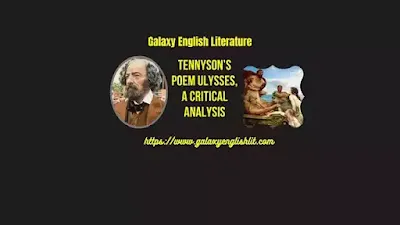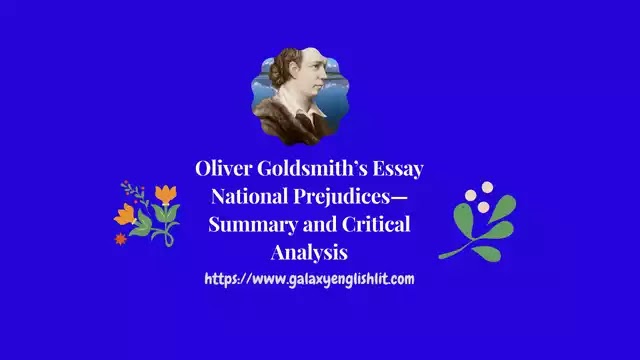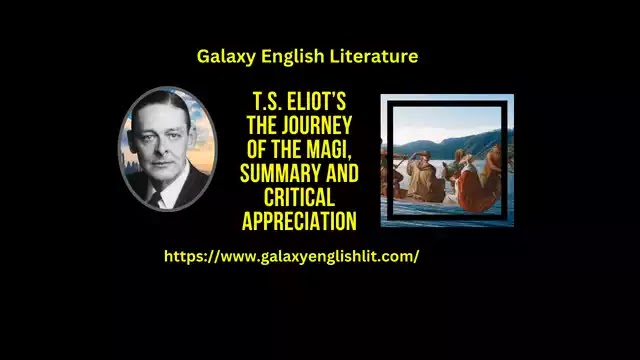The Poem: Its Publication; Its Source:
Ulysses was first published in 1842, like Break, Break, Break and The Two Voices, soon, after Arthur Hallam's death, and it expresses the poet's feeling about the need of going forward and facing life, despite the bereavement he has suffered. Ulysses was the legendary Greek hero, the story of whose heroic deeds and adventures is sung by Homer in his Odyssey.
 |
| Tennyson’s Poem Ulysses | A Critical Analysis |
However, Tennyson's Ulysses is closely modelled on Dante's Ulysses as sketched in the 26th Canto of the Inferno. The influence of classical poets, Homer and Virgil, is seen in phrasing and many verbal echoes. But despite this indebtedness, Tennyson's treatment is original, and Ulysses remains, “the noblest of all Tennyson's classical poems” (Fowler).
A Dramatic Monologue:
Ulysses is a dramatic monologue. It is dramatic because it expresses the feeling not of the poet, but of Ulysses, and it is monologue because only one person speaks throughout. The others merely listen to him. Ulysses, the hero of the Trojan War, returned to his island state of Ithaca after twenty years. He has been ruling his state for some time, but the life of peace, devoid of adventure, does not suit him. In the poem, he is supposed to be standing at the coast of the sea, surrounded by his sailors, whom he exhorts to follow him in quest of more knowledge and experience.
Arguments in Favour of Travel and Adventure:
He gives arguments after arguments in favour of a life of travel and adventure. First, the people of the island are uncivilised, the laws are unjust, and so he will not like to rule there. His wife has grown aged, and the people do not understand his real nature. Secondly, he has grown used to a life of adventure, and the inactive life of a king does not suit him. He has visited many lands and known many people with their different habits and ways of life, but there are still many more lands to be seen, and he is eager to visit them. The more he knows, the greater is his thirst for knowledge. He would like to, “follow knowledge like a sinking star.” Human life is short and knowledge is infinite, and, therefore, no time is to be wasted. At home one becomes rusted; one shines only in use. He has only a few more years to live, and he would devote them to the pursuit of as much knowledge and experience as possible.
As regards his island, he has no worry about its government. His son Telemachus is quite sensible and prudent, and he would look after the welfare of his state. He would give due worship to the gods, and would also take care of his old mother with love and tenderness. He is interested in the ordinary, everyday duties of life, while he himself craves for travel and adventure. So, he would be quite happy to stay in the island and rule over it, while he himself would enjoy his life of adventure abroad.
Therefore, they must set sail with him that very night. In the past they have cheerfully faced together great dangers and difficulties, and they would also do so in the future. In the past they achieved much that was noble. No doubt, they have grown old, but noble achievement is possible even in old age. They would sail towards the west even beyond the western horizon. It is just possible that they would be drowned, but it is also possible that they may reach the Happy Isles, the abode of their dead heroes. They may be physically weak, but they are still strong in determination. So they would set sail, “to strive, to seek, to find, and not to yield.”
The Subjective Note:
Ulysses has a well - marked autobiographical element. It is expressive of Tennyson's feelings about the need of facing life, despite the bereavement he had recently suffered. As John Pettigrew points out, “Ulysses, also springs from powerful feelings prompted by Hallam's death, and it shows Tennyson finding release from pain in the creation of the beautiful, and his fondness for adapting legend to clothe personal emotion,” Ulysses is deeply personal in such things as, “its expression of a sensibility divided between the claims of retreat and involvement, its note of courage, its elegiac melancholy, its restless dissatisfaction with the present and wish for fuller life, its yearning for the days that are no more and far, far away.” Tennyson's remark that there was much of himself in the poem is true in a wider sense than he intended, for Ulysses is also quintessential of the, ‘Tennysonian’ gathering into itself all that is representative and best in his early work and displaying magnificently its infinite riches in a little room . “The work is Tennysonian, and its abundance, variety and complete competence show just how impossibly limiting that adjective is.”
Different Interpretations:
Ulysses is a complex work of art and as such is capable of different interpretations. It has been interpreted as an expression of the Victorian urge for action, for life, for excitement, for travel, adventure and discovery. But it has also been interpreted as an escape poem. Says John Pettigrew, “Ulysses is great if read as a poem expressive of an indomitable will, summoning up every reserve of resolute courage and seeking new worlds to conquer. But, as Tennyson's situation at the time of its writing and the literary tradition that he evokes suggest, Ulysses is far richer than that. Indeed, its essential greatness stems not from the power of noble feeling, but from the complexity of characterization with its conflict of feelings”. That this is so is suggested strongly even by a cursory examination of Ulysses’ speech. He talks of noble work and shows us that Ithaca cries out for it, but he is idle and leaves leadership to Telemachus. He says that he is following knowledge and seeking fuller life, but he forces us to ask if he is not rather seeking escape from duty in unceasing activity, even in suicide. He is true to himself, but apparently false to his kingdom and his mariners. Is he, proud, or merely egocentric? Promethean, or Satanic? The responsible man of action, or the escapist? Is it he, or Telemachus, who is most like Arthur, ‘Ideal manhood closed in real man’? And the contradictions involved in what he says are reinforced by all the resources of a masterly poet.
Escapism:
“The final passage is one of literature's grandest, Churchillian in its rhetoric and resolve.” Its immense dignity and power to matter and manner move one deeply, as Ulysses means them to do, and continue to do so after many readings. Nevertheless, Tennyson has already established an ambiguous attitude towards his hero, one which forces our recognition of depths below the dazzling surface. The verse is measured and stately, but it also undercuts the surface strength with the ‘poetical decorativeness’, and melancholy music of lines like:
The lights begin to twinkle from the rocks:
The long day wanes: the slow moon climbs; the deep
Moans round with many voices.
The lines’ slow movement and elegiac quality help to stress the element of the escapist and suicidal in Ulysses’ motives. So do other things, notably the ambiguity of image and symbol. Ulysses sets out at night (one would surely expect dawn in a work descriptive simply of romantic grandeur). Is the sea calling to a journey of renewal and life, or dreamful ease and death? Is it the sea of the end of Locksley Hall, or its other seas of escape? Certainly the seas here are not the ‘sounding furrows’ Ulysses calls them; no ‘mighty wind arises roaring seaward’, the landscape is still, the vessel only puffs her sail, the dark seas gloom and moan. Are the Happy Isles the Avilion of Mort D' Arthur, a land of renewal, or Lotosland and ‘summer isles of Eden’? The final paragraph involves much more than a man braving the struggle of life, for the atmosphere is redolent of death, linked now not primarily with Ithaca as earlier, but with the world beyond— an island that began as a kind of sterile Shalott has become the England of the political poems. And is it accidental that the glorious last line should irresistibly summon up the shade of Milton's Satan with his, ‘courage never to submit or yield’?
The Poem: Its Artistic Merits:
Ulysses is a noble poem concerned with character delineation rather than with the narration or action. It displays Tennyson's command over language and his felicity of phrasing. He has said what he had to say in the fewest possible words. This makes the diction terse and epigrammatic. Many of the lines of the poem have passed into common, everyday proverbs. Thus we have: “To follow knowledge like a sinking star”; “to strife, to seek, to find, and not to yield”, etc. Tennyson was a consummate artist and he chooses his words both with reference to their sense and their sound. Music is created by the clever use of alliteration, liquid consonants ‘l’, ‘m’ and ‘n’ and the bringing together of a number of vowel sounds, as in the following:
There lies the port, the vessel puffs her sail,
There gloom the dark broad seas.
The poem is written in blank verse which, especially in the last lines, acquires almost a Miltonic grandeur, and sweep and majesty of movement.





